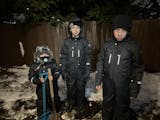Swaddling, the art of snugly wrapping a baby in a blanket, is like a magical sleep charm for many infants. It replicates the warmth and sense of security from the womb, assisting babies in relaxing and entering a peaceful sleep.
As the clock ticks toward those essential night feedings, new parents grapple with the question: should I keep the baby swaddled during night feedings?
It is generally recommended to unswaddle babies during night feedings. Swaddling during feeding can have potential drawbacks, including the risk of overheating, suppression of important reflexes, and difficulties in latching on babies who can move freely.
The recommendation is to assess your baby's needs: if they feed well while swaddled, it's okay to keep them swaddled; however, if they struggle to eat, unswaddling may be a helpful solution. Continue reading to learn why it's often suggested to unswaddle during night feedings.
Should You Unswaddle Baby For Night Feeds?
Yes, it is a good idea to unswaddle your baby during night feedings. Babies use more than just their mouths for nursing; their hands and arms help them find the nipple, get milk, latch on, and show they are hungry. We don't even eat without using our hands.
Hunger signs go beyond crying. Even before they get fussy, babies often move their fists toward their mouths to say they are ready to eat again. While your baby might like being swaddled because it feels cozy, it is better to unswaddle for feeding. Swaddling is like being in the womb, helping them relax and sleep, but feeding them while swaddled can make it harder for them.
So, even if it seems nice for them to fall asleep right after eating, unswaddling during night feedings is a good choice for a better feeding experience.
When to Unswaddle During Night Feedings?
Deciding when to unswaddle during night feedings depends on the baby's feeding method and specific needs.
Bottle Feeding A Swaddled Baby
To ensure easy and comfortable dream feeds, it's crucial to un-swaddle your baby. This allows you to observe hunger cues more clearly. Feeding a swaddled baby poses the risk of becoming too comfortable, potentially leading to early sleep once the milk reaches the stomach. This could disrupt their sleep routine, emphasizing the importance of removing the swaddle during dream feeds to keep the baby awake and engaged for a full feeding, which is crucial for healthy growth.
Breastfeeding A Swaddled Baby
Breastfeeding a swaddled baby is generally not recommended. Swaddling may interfere with breastfeeding by causing delayed feeding behaviors and reduced competency in suckling during the initial feeds. This has the potential to result in a reduction in milk production. For successful breastfeeding, it's advised to un-swaddle the baby before nursing.
Before unswaddling, ensure a changed diaper and burping to prevent discomfort, and be attentive to hunger cues. If latching difficulties or fussiness arise, taking a moment to relax and rock the baby before attempting to feed again can be helpful. Consult a doctor if persistent latching or feeding issues are observed, ruling out any underlying concerns.
What Are The Benefits Of Night Feeding?
Night feedings contribute significantly to a baby's well-being. Here are some major benefits:
1. Essential for Growth and Development
Night feedings are crucial for a baby's growth and development, particularly during the initial months when newborns have small stomachs. Frequent feedings every two to three hours, including at night, ensure that infants receive the necessary nutrients for healthy development.
2. Stimulates Milk Supply for Breastfeeding Mothers
Night feedings are vital for breastfeeding mothers in stimulating milk letdown and maintaining an ample milk supply. Nursing on demand, day and night, helps ensure that babies receive sufficient milk to satisfy their hunger, fostering optimal growth.
3. Bonding Opportunity for Bottle-Feeding Mothers
Nighttime feedings for bottle-feeding mothers provide a unique opportunity to bond with their babies. It's a time to ensure proper bottle latching, allowing for adequate milk transfer while nurturing the parent-child connection.
4. Dream Feeding for Extended Sleep Cycles
Incorporating a dream feed, feeding a sleeping baby before the parents go to bed, can contribute to extended sleep cycles. This practice promotes uninterrupted sleep for the baby and parents and ensures the baby receives essential nutrition at night.
5. Promotes Adequate Nutrition During Growth Spurts
Babies undergoing growth spurts or developmental leaps experience increased hunger. Night feedings become especially important during these periods, ensuring babies receive the extra nutrition they need for optimal development.
6. Supports Proper Latching for Breastfed and Bottle-Fed Babies
Irrespective of the feeding technique, mothers need to confirm that their baby attaches properly to the breast or bottle. This ensures efficient milk transfer, meeting the baby's nutritional needs during night feedings.
7. Maintains Consistency in Feeding Schedule
Night feedings help maintain a consistent feeding schedule, which is essential for regulating a baby's circadian rhythm and promoting healthy sleep patterns. Consistency in feeding supports overall well-being and growth.
8. Addresses Hunger and Satiety Needs
Babies have fluctuating hunger and satiety needs, especially during the early months. Night feedings allow parents to respond promptly to a baby's hunger cues, ensuring they receive nourishment when needed.
How Long Should Newborn Night Feeds Take?
The duration of newborn night feeds can vary, but typically, they may take about 20 to 40 minutes. It's important to allow the baby to feed at their own pace and ensure a comfortable and relaxed environment during nighttime feedings.
- For bottle-fed babies, avoid forcing them to take more milk than they need, as this won't promote longer sleep and may lead to colic and distress.
- Breastfed babies may be fed every two to three hours, and offering the breast, even if recently fed, can help soothe them back to sleep. Breastfeeding provides comfort, and there's no risk of overfeeding a breastfed baby.
Make sure the feeding time is calm and quiet for both bottle-fed and breastfed babies. Pay attention to what your baby likes and needs during feeding, and create a comfortable routine.
How To Keep Baby Awake During Feeding At Night?
Here are a few tips that will help you keep your baby awake during night feedings:
- Encourage healthy feeding and sleeping habits by keeping your baby awake during meals.
- Observe and track your baby's natural sleep and hunger patterns.
- Feed your baby when she's most alert, right after waking up or well before bedtime.
- Create an eating environment by choosing a well-lit room; avoid feeding in darkness to prevent signaling sleep time.
- Keep the environment cool; unwrap the swaddle or remove bedtime attire to send an 'awake' message.
- Maintain alertness by moving your baby, burping her, changing positions, and making gentle noises.
- Bond with your baby during feeds by playing music, singing, or speaking, fostering engagement and positive feeding routines.
Discover the secrets of soothing your little one by learning how to put a baby to sleep in 40 seconds.
Wrap Up
The choice of whether to keep a baby swaddled during night feedings is nuanced and should be made with careful consideration of individual circumstances. While swaddling can offer comfort and better sleep, it necessitates adherence to safety guidelines, considering the baby's age, development, and medical concerns. Parents need to find a middle ground, ensuring the swaddle is snug but not overly tight and the baby is positioned on their back when sleeping. Consulting with a pediatrician or healthcare provider for personalized guidance is crucial.
FAQs
Should Babies Be Swaddled Overnight?
Yes, babies can be swaddled overnight if safe swaddling practices and sleep guidelines are followed. Swaddling can contribute to helping babies sleep more soundly during both daytime naps and nighttime sleep. It's important to ensure that the swaddle is done correctly, not too tight, and that the baby is placed on their back to sleep. Adhering to these safety measures minimizes the risk associated with swaddling, making it a suitable practice for creating a secure and comfortable infant sleep environment.
At What Age Should You Stop Swaddling Baby At Night?
Experts recommend stopping swaddling when your baby starts attempting to roll over, typically around two months. This milestone is crucial as swaddling can hinder a baby's ability to turn over, posing a potential safety risk. Once you have observed signs of your baby trying to roll, it's advisable to discontinue swaddling. After stopping swaddling, you can dress your baby for sleep in a nightgown, sleeper, or pajamas over an undershirt and diapers to ensure comfort and safety during nighttime sleep.
When To Stop Night Feeds?
Most doctors say you can stop waking your baby for night feeds around 3-4 months if they grow well and gain weight. However, some babies might need night feeds until they are 9 months old. It's best to talk to your doctor about when it's okay to stop night feeds based on your baby's needs.
Can You Burp A Swaddled Baby?
Yes, you can burp a swaddled baby. However, it is beneficial for the baby to access their entire body, just as they do during feeding. This helps ensure a more effective and comfortable burping process.








































